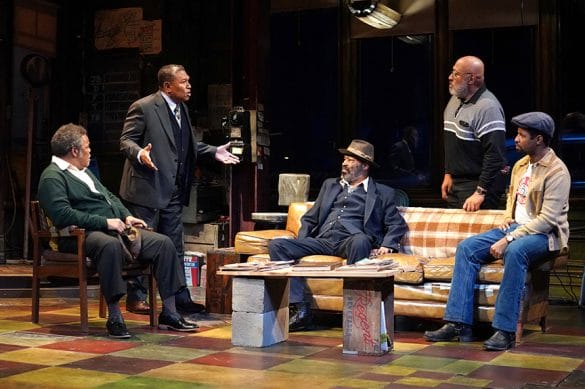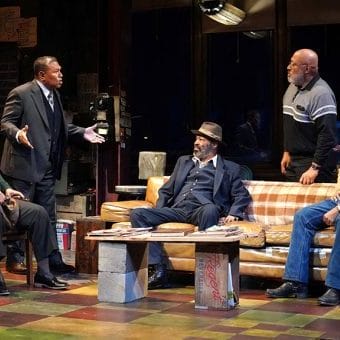Article by Rebecca Romani
February 7, 2020

It’s sometime, maybe mid-day, maybe early morning, and the jitneys, or gypsy cabs, run in and out of Jim Becker’s car service. As the five assorted drivers sit and talk at the station, Becker reminds them the people deserve a good clean car and a good driver. It’s part of what keeps community together.
August Wilson’s Jitney, now on stage in revival at The Old Globe, is a brilliant look at life in the Hill District, a historically African-American neighborhood in Pittsburg, where the late playwright based a 10-play cycle about working class African-American life.
It’s early still in the year, and yet Jitney promises to be one of the top shows of the San Diego theatre season. A substantial drama with a big if sometimes vociferous heart, The Old Globe’s revival of Jitney rises from the stage with wit and humble grace, filling the theatre.
Set in 1977, the play focuses on Becker’s car service, a collection of jitneys that serve the community because no other White-owned cab services will. A decent man in his 60’s, Becker tries to run a tight ship, keeping on middle-aged men like Turnbo (Ray Anthony Thomas), who has a good heart, but an uncontrollable need to jump into everyone’s business, alcoholic Fielding (Anthony Chisholm), once custom tailor to top musicians, and giving a job to the up and coming Vietnam Vet, Youngblood (Amari Cheatom).
August Wilson, who passed in 2005, built his reputation as one of America’s most brilliant contemporary playwrights with a tenacity and ferocity that took him from small time theatre to Broadway. His ear attuned to the everyday cadence and complexities of African-American life, like few playwrights before or since, earned him two Pulitzers and a Tony. And you can hear this as the drivers cycle in and out of the station, their conversations and occasional tiffs running to family, fares, and, eventually, to secrets and hopes new and old.
Like others of Wilson’s Century play cycle about Pittsburg, Jitney is forged in community. Wilson sets up the station as the one of the chambers of the heart of the Hill while the jitney is the artery, ferrying as it does people to church, to the store, to their neighbors, to the hospital. The drivers drive all manner of places and strengthening the bonds of community as they go with gossip, news, exchanges of stories, and advice.
But the station, and the service it provides, is living on borrowed time, surrounded by the slowly emptying storefronts and dying promises of better buildings to come.
And that borrowed time is almost up, one of the many secrets that spill out in Jitney.
August Wilson’s play may be in located in the late-70’s but Wilson is both relevant prophet and guide, speaking to us of spaces and places that sit empty from San Diego to Boston, waiting for the magic wand that will pretty up the buildings and jack up the prices, all the while showing us how community is served, foreshadowing Uber and Lyft, in ways they can only dream of aspiring to.
Wilson also loosely hangs his play on the parable of the prodigal, foreshadowing issues that have faced African-American males for decades. Youngblood, the young Vietnam vet is seeking to turn his life around and buy a house for himself, his girlfriend and their young son, but the girlfriend suspects he is running the streets instead of working overtime. When Youngblood gets into it with Turnbo, a gun is drawn and you hang on the moment, fearful with the weight of the intervening years since 1977, that things will go south.
Then there is Booster (Francois Battiste), Becker’s son. Becker’s pride, as he calls him, and Becker’s sorrow. A kid with a bright future in high school, Booster has just finished a 20-year prison term for shooting his white girlfriend who accused him of rape when her father caught them. Do the math, and you realize Booster went in before the end of Jim Crow, six years before the March on Washington, seven years before Selma. For Becker and for Booster, the years lost to prison, and the death of Boosters’ mother from a broken heart, may be too wide a gap to bridge.
One of the most deeply touching scenes comes late in the show when the drivers eulogize Becker, killed in a freak accident at his second job. Booster’s late realization that Becker was more than he realizes is both sad and satisfying, the prodigal son has come home.
Wilson’s characters are warm, vibrant, and strongly written. Doub (Keith Randolph Smith) is the voice of caution as the Korean era war vet who’s seen how the myriads of economic promises have (mostly not) panned out. Shealey (Harvey Blanks) brings comic relief as the sharply dressed numbers runner who drops by to take bets over the phone while Philmore (Brian D. Coates) brings a tender heart as the doorman squabbling with his wife.
Critics may see Jitney as short-changing women, and it’s true they mostly show up on the phone or in conversations. But Rena (Nija Okoro), Youngblood’s girlfriend and the mother of his son, more than makes up for the women one doesn’t see. She’s a dynamic foil for Youngblood, half-jokingly calling him out for not consulting her on the choice of the house he wants to buy them.
Director Ruben Santiago-Hudson gives Jitney a brilliant staging with pacing and breaks that feel like a TV sitcom or a procedural drama- a show shot before a live studio audience, albeit with longer sections. Broken up into fourths, a beautiful blues and soul-inflected sequence by Bill Sims. Jr. separates each act, and the actors return to inhabit their characters, moving into personas as the lights go up.
Award-winning set designer David Gallo’s set is a busy masterpiece of understated detail. Part of the traveling production, the comfy but sagging couch, the pay phone of the wall, the worn desks and chairs speak of a long association with the neighborhood. The chockablock office sits well on The Old Globe stage, becoming almost a member of the cast in and of itself. The use of the windows and doors is striking and the inside/outside quality allows for some great exchanges when Rena comes to see Youngblood.
Santiago-Hudson’s deft directing enhances what is a finely tuned cast clearly in love with Wilson and his look at a dying community service. In Santiago-Hudson’s’ uniformly splendid performers Wilson’s play has found the men- and woman- to match his message.
A number of the cast members were in the most recent Broadway production of Jitney, while the rest have impressive credits of their own. Santiago-Hudson, Gallo, and the late Bills Sims, an accomplished blues-man and composer have been with the touring production since its inception. It’s a rare gift when a show can bring with it so many of the people who were instrumental in its realization and have such a close relationship with the playwright’s work.
Wilson’s play may be about jitneys on the surface, but deep down, it is a prophet’s loving homage to the little things that create community, be it in Pittsburgh or your own burg.
Catch Jitney, before its license expires. This show promises to one of the best of a busy theatre season.
For tickets, times, and information about informative presentations after the show, please visit The Old Globe website HERE.



